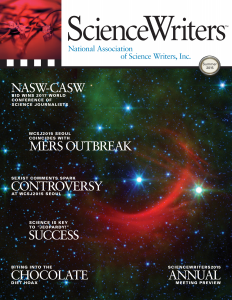By Maura Mazurowski
Science and journalism can change the world — or at least make an impact on it.
On April 1, award-winning National Public Radio science reporter Richard Harris came to Goodwin Hall with the presentation “Using the tools of science and journalism to make a difference.”
Harris joined NPR in 1986 and has since reported on topics related to science, medicine and the environment. In the past year or so, however, Harris’ journalistic focus has shifted from environmental to biomedical research.
A central theme of Harris’ talk was the importance of updating society with environmental changes and scientific events occurring throughout the world, despite how difficult the news may be to hear.
“These are stories people may not want to hear, but they’re stories that are important to tell,” Harris said.
One thing that science journalists like to do is bring the world to people, Harris said. And that’s exactly what he does. Among the many stories that Harris has reported on, he spent a large portion of the discussion sharing his experiences writing about the 2010 BP oil spill in the Gulf of Mexico. The initial impact of the oil explosion killed 11 people and created a massive mess in the ocean that took months to bring under control.
With a plane ticket purchased and a suitcase packed, Harris had plans to travel to New Orleans to report on the spill. Before leaving, Harris received a tip that put a hold on his travel plans.
A marine scientist friend of Harris’ mentioned that when giving briefings regarding the spill, the Coast Guard would play a video showing the oil bubbling up from a horizontal and bent pipe on the seafloor. Harris said he was unsure how to interpret how much oil was flowing out of a pipe, but he knew that there were people that would.
After obtaining a copy of the video, Harris first called a fluid dynamicist and was advised to contact someone that studies particle image velocimetry (PIV), an optical method of flow visualization. Harris then contacted Steve Wereley, a PIV specialist working at Purdue University, to study the film.
Harris contacted another PIV specialist and an astrophysicist at University of California, Berkeley, to get their opinion as well. In the end, the three specialists concluded that the pipe was spilling from 50,000 to 100,000 barrels of oil every day.
The official number that had been released to the public was 5,000 barrels a day.
Three different people came up with “essentially the same numbers,” Harris said. “Even if the error bar was large, it was easily a larger magnitude than what had been reported so far.”
Harris went on air and reported the results these scientists found. He never ended up traveling to the Gulf of Mexico — he said that there was too much work to be done in Washington, D.C. The Obama Administration went on to take their own measurements and came up with similar numbers.
“I got people to pay attention to this issue,” Harris said.
To Harris, that’s the point of science journalism: To make a difference. He was eventually invited to the Gulf to study the effects of the oil spill — he even took a submarine ride a mile deep into the ocean and studied the sea floor.
Harris continued describing his journalistic adventures, including a trip to Utah to investigate the effects of dust on snow and some time spent in Antarctica — though he has had the opportunity to travel to all seven continents.
Afterward when taking questions from the crowd, Liz Kirchner, a contract writer for Virginia Tech’s College of Natural Resources, asked what kinds of equipment Harris uses during his travels.
While the iPhone is his backup recorder, Harris most commonly brings with him a pistol recorder “the size of his fist,” a shotgun mic and a high-quality camera.
Zeke Barlow, the academic programs and research communications manager, questioned how Harris deals with “science deniers.”
“I say I’m a science reporter, and I report the science, and this is what the science says,” Harris said.
Harris said that he acknowledges and accepts that there are “close-minded people” who will not agree with his work. He still continues to confirm that the science he reports is accurate and to tell the best story he can.
“I’m talking to the open-minded people and accept the fact that there is a chorus of closeminded people,” Harris said. “That’s life.”
While still in the transition to biomedical reporting, Harris said that he is aware that his work will not always be welcomed by the medical field, but that won’t keep him from reporting on it.
“As I switch from environmental stuff to biomedical stuff, there are still things I can do that won’t make me popular among biomedical scientists … but they are things that need to be said and things that will make a difference,” Harris said. “At least, I hope so.”
“NPR journalist recounts global experiences,” Collegiate Times, posted April 1, 2015.
Maura Mazurowski is news editor of Virginia Tech’s Collegiate Times.
(NASW members can read the rest of the Summer 2015 ScienceWriters by logging into the members area.) Free sample issue. How to join NASW.

